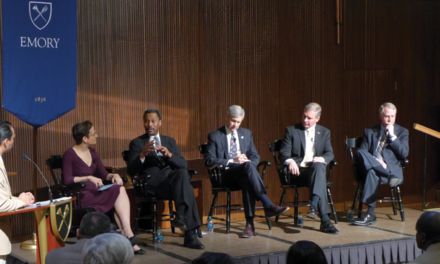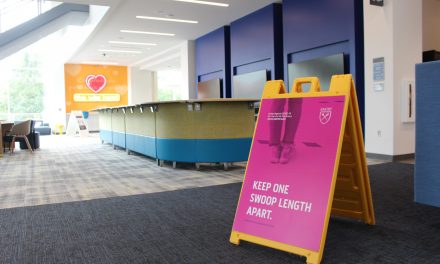From the ubiquitous presence of green compost and blue recycling bins on campus to showcasing Leadership in Energy and Environmental Design certification plaques on buildings, Emory University prioritizes sustainability, advertising a 70% landfill diversion rate last year. The University, however, has not sustained its environmental enthusiasm during the pandemic.
Instead, all of the University’s compostable waste since September 2020 has been sent to landfill, a situation unforeseen just one year ago.
Last Earth Day coincided with a temporary reduction in daily global carbon emissions, the result of pandemic-induced lockdowns that grinded the global economy to a halt. But the pandemic’s long-term environmental repercussions from a volatile economy and the increased consumption of single-use plastics are becoming clear.
Emory’s waste strategy failed to escape the environmental casualties of the pandemic, as the University’s former compositing partner, Southeast Green Industries, succumbed to compost market failures in September. Since then, all compostable waste has been rerouted to landfill because of pandemic market changes.
“There were only a couple providers and then they basically said they’re not going to [compost] anymore, whether it’s technical reasons because of permitting, weather issues or they just didn’t feel like it was a business opportunity they wanted to pursue any longer,” Vice President and Chief Planning Officer of Campus Services Robin Morey explained. “We got short term notice back in the fall … so our only solution at that point was to … take that compost to the landfill.”

Graphic by Mia Usman
Associate Vice President of Sustainability, Resilience and Economic Inclusion Ciannat Howett (87C) added that financial pressures due to COVID-19 and torrential rain in the fall that flooded composting fields contributed to Southeast Green Industries’ demise, creating a “heartbreaking” crisis.
“We were just caught flat footed,” Howett said. “In fact, we did not know that our vendor was in such bad trouble. I mean it was really pretty shocking.”
Emory community members were notified of this change in a Sept. 30 “Dooley’s Report” email. This was the only widespread notification that students received about the change, resulting in many being unaware of the change.
“Transparency is something we have not seen regarding [the waste change],” said Molly Gassman (23B). “I didn’t know about that until a week ago. There’s green compost bins everywhere.”
Apart from the mass-communicated “Dooley’s Report” email, Emory community members could have learned about the composting change in an Emory Report article, through an announcement on the Office of Sustainability Initiatives’ (OSI) Zero Landfill Waste page or in OSI’s Zero Waste Ambassador Trash Talks.
Given that the Emory community has already been “trained” to properly separate their waste, Morey said the University “intentionally” left the compost bins out, even though everything placed in those bins would go to a landfill. Telling the Emory community that their waste would not be composted would be “a challenge to communicate” and “a really risky situation,” he said. Morey expects to find a new partner this spring and the University to resume “normal” composting later this summer.
While some composting companies are still functioning, Morey deemed those contracts as “not economically viable” for the University this year, noting that institution-wide financial constraints helped inform his decision. Alternative contracts would not be able to handle the entirety of Emory’s compost, Howett added.
The University slashed the president’s, presidential leadership team’s and deans’ salaries by 15% in May 2020 and implemented a 5% pay cut for faculty and staff making more than $75,000 in July 2020 to compensate for the institution’s decreased revenue due to COVID-19. These cuts in part funded Campus Services’ extra expenditures on “additional help” to support more intensive sanitization practices.
“When I made that call, I was looking at how long is this going to be, what’s our ultimate solution going to be, how much money we’re talking about and we’re already reducing the amount of landfill because we don’t have as much activity on campus,” Morey said.
The reduced amount of landfill is due to the dramatically decreased capacity on campus this year relative to full capacity and not because of the compost diversion, Morey clarified.
The University looked for an interim solution, but proposals would only cover part of Emory’s compost. Noting that there’s “not enough infrastructure” for a company to take all of Emory’s compost, Howett said the University would’ve had to pay “a lot of money for a little bit of material.”
“As a result of the marketplace failure that has been realized, we have engaged a consultant who is reviewing our overall waste diversion program and providing guidance on how best to move forward despite the industry strain that COVID-19 has presented,” Facilities Management, a division of Campus Services, wrote in an April 16 email to the Wheel.
Waste production and diversion during the pandemic
With less people and activities on campus, the University is producing substantially less waste than last year, according to data from Facilities Management. From September 2020 to February 2021, the University produced 1,443.11 tons of waste, a 49.41% decrease from the 2,852.48 tons produced between September 2019 and February 2020.
 While less waste has been produced, the absence of composting led to a stark increase in the monthly tons of waste put in landfills this year compared to last. Approximately 134.24 tons of waste were placed in landfills in October 2019 compared to 114.98 tons of landfills in October 2020, but in February 2020 there was only 92.81 tons of landfill waste compared to 217.77 tons in February 2021.
While less waste has been produced, the absence of composting led to a stark increase in the monthly tons of waste put in landfills this year compared to last. Approximately 134.24 tons of waste were placed in landfills in October 2019 compared to 114.98 tons of landfills in October 2020, but in February 2020 there was only 92.81 tons of landfill waste compared to 217.77 tons in February 2021.
 The combination of decreased waste production and relatively high landfill rates resulted in a severe drop off in monthly landfill diversion rates.
The combination of decreased waste production and relatively high landfill rates resulted in a severe drop off in monthly landfill diversion rates.
“This negative impact was realized when the vendors that haul and process Emory’s compost either went out of business or cut back operations, victims of the financial crisis resulting from the COVID-19 pandemic,” Facilities Management wrote. “The situation was exacerbated by above-average rainfall, which made the fields in which compost is stored and rotated inaccessible.”
The average monthly diversion rate, the percent of waste not sent to a landfill, was 46.06% from this past September to February, nearly 4% less than the overall 2015 landfill diversion rate, the first year data was made available on the Emory Sustainability Initiative site. In comparison, the average monthly diversion rate between September 2019 and February 2020 was about 74.34%, according to data from Facilities Management.
 Student reactions
Student reactions
Although the overall landfill waste has decreased, Co-Founder of the Plastic Free Emory Project Nithya Narayanaswamy (21Ox) told the Wheel that the pandemic has resulted in additional single-use waste.
“During the pandemic, single-use plastic is at a much higher level because people are using disposable masks and other disposable items for the sake of being safer,” Narayanaswamy said. “We try to educate people on the alternatives that are there.”
Gassman expressed that Emory’s sustainability initiatives are insufficient even with the challenges.
“Emory’s kind of performative in the way they handle waste,” Gassman said. “I remember the first time moving into college I was not taught what goes in compost or what goes in recycling. You hear a lot, you see a lot on Emory’ campus about all their sustainability initiatives … but I feel like in practice they don’t actually do enough to teach students to live that out.”
Member of the Oxford Climate Reality Project Environmental Action Committee Alexandra Aladham (22Ox) explained Emory’s sustainability initiatives were the selling factor for her to attend the school, so she’s frustrated by the University’s lack of transparency regarding composting this year.
“It’s frankly disappointing because I remember … when I was looking into Emory and deciding that I wanted to go there a big reason was because they almost bragged about their sustainability and waste handling,” Aladham said. “But then they’re kind of hiding the truth like, ‘Oh, we’re not really composting properly anymore or handling waste diversion properly.’”
A second part of this article will be released on April 22 (Earth Day) detailing some of the University’s broader sustainability initiatives.
This story was updated on 4/22 to include alternative ways the Emory community could have learned about the temporary diversion of compost to landfills, apart from the widespread “Dooley’s Report” email.
This story was updated on 5/4 to remove a quote from Molly Gassman regarding the school’s sustainability mission.







